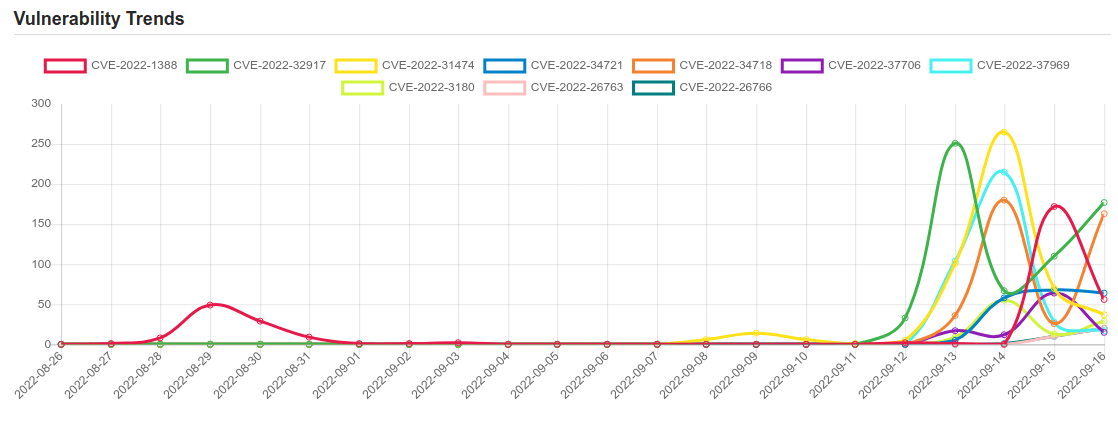Daily Vulnerability Trends: Sat Sep 17 2022

| CVE NAME | CVE Description |
| CVE-2022-29021 | A buffer overflow vulnerability exists in the razerkbd driver of OpenRazer up to version v3.3.0 allows attackers to cause a Denial of Service (DoS) and possibly escalate their privileges via a crafted buffer sent to the matrix_custom_frame device. |
| CVE-2022-29023 | A buffer overflow vulnerability exists in the razermouse driver of OpenRazer up to version v3.3.0 allows attackers to cause a Denial of Service (DoS) and possibly escalate their privileges via a crafted buffer sent to the matrix_custom_frame device. |
| CVE-2022-29022 | A buffer overflow vulnerability exists in the razeraccessory driver of OpenRazer up to version v3.3.0 allows attackers to cause a Denial of Service (DoS) and possibly escalate their privileges via a crafted buffer sent to the matrix_custom_frame device. |
| CVE-2022-31659 | VMware Workspace ONE Access and Identity Manager contain a remote code execution vulnerability. A malicious actor with administrator and network access can trigger a remote code execution. |
| CVE-2022-31656 | VMware Workspace ONE Access, Identity Manager and vRealize Automation contain an authentication bypass vulnerability affecting local domain users. A malicious actor with network access to the UI may be able to obtain administrative access without the need to authenticate. |
| CVE-2022-39135 | In Apache Calcite prior to version 1.32.0 the SQL operators EXISTS_NODE, EXTRACT_XML, XML_TRANSFORM and EXTRACT_VALUE do not restrict XML External Entity references in their configuration, which makes them vulnerable to a potential XML External Entity (XXE) attack. Therefore any client exposing these operators, typically by using Oracle dialect (the first three) or MySQL dialect (the last one), is affected by this vulnerability (the extent of it will depend on the user under which the application is running). From Apache Calcite 1.32.0 onwards, Document Type Declarations and XML External Entity resolution are disabled on the impacted operators. |
| CVE-2022-35837 | Windows Graphics Component Information Disclosure Vulnerability. This CVE ID is unique from CVE-2022-34728, CVE-2022-38006. |
| CVE-2022-36114 | Cargo is a package manager for the rust programming language. It was discovered that Cargo did not limit the amount of data extracted from compressed archives. An attacker could upload to an alternate registry a specially crafted package that extracts way more data than its size (also known as a “zip bomb”), exhausting the disk space on the machine using Cargo to download the package. Note that by design Cargo allows code execution at build time, due to build scripts and procedural macros. The vulnerabilities in this advisory allow performing a subset of the possible damage in a harder to track down way. Your dependencies must still be trusted if you want to be protected from attacks, as it’s possible to perform the same attacks with build scripts and procedural macros. The vulnerability is present in all versions of Cargo. Rust 1.64, to be released on September 22nd, will include a fix for it. Since the vulnerability is just a more limited way to accomplish what a malicious build scripts or procedural macros can do, we decided not to publish Rust point releases backporting the security fix. Patch files are available for Rust 1.63.0 are available in the wg-security-response repository for people building their own toolchain. We recommend users of alternate registries to excercise care in which package they download, by only including trusted dependencies in their projects. Please note that even with these vulnerabilities fixed, by design Cargo allows arbitrary code execution at build time thanks to build scripts and procedural macros: a malicious dependency will be able to cause damage regardless of these vulnerabilities. crates.io implemented server-side checks to reject these kinds of packages years ago, and there are no packages on crates.io exploiting these vulnerabilities. crates.io users still need to excercise care in choosing their dependencies though, as the same concerns about build scripts and procedural macros apply here. |
| CVE-2020-14882 | Vulnerability in the Oracle WebLogic Server product of Oracle Fusion Middleware (component: Console). Supported versions that are affected are 10.3.6.0.0, 12.1.3.0.0, 12.2.1.3.0, 12.2.1.4.0 and 14.1.1.0.0. Easily exploitable vulnerability allows unauthenticated attacker with network access via HTTP to compromise Oracle WebLogic Server. Successful attacks of this vulnerability can result in takeover of Oracle WebLogic Server. CVSS 3.1 Base Score 9.8 (Confidentiality, Integrity and Availability impacts). CVSS Vector: (CVSS:3.1/AV:N/AC:L/PR:N/UI:N/S:U/C:H/I:H/A:H). |
| CVE-2022-36113 | Cargo is a package manager for the rust programming language. After a package is downloaded, Cargo extracts its source code in the ~/.cargo folder on disk, making it available to the Rust projects it builds. To record when an extraction is successful, Cargo writes “ok” to the .cargo-ok file at the root of the extracted source code once it extracted all the files. It was discovered that Cargo allowed packages to contain a .cargo-ok symbolic link, which Cargo would extract. Then, when Cargo attempted to write “ok” into .cargo-ok, it would actually replace the first two bytes of the file the symlink pointed to with ok. This would allow an attacker to corrupt one file on the machine using Cargo to extract the package. Note that by design Cargo allows code execution at build time, due to build scripts and procedural macros. The vulnerabilities in this advisory allow performing a subset of the possible damage in a harder to track down way. Your dependencies must still be trusted if you want to be protected from attacks, as it’s possible to perform the same attacks with build scripts and procedural macros. The vulnerability is present in all versions of Cargo. Rust 1.64, to be released on September 22nd, will include a fix for it. Since the vulnerability is just a more limited way to accomplish what a malicious build scripts or procedural macros can do, we decided not to publish Rust point releases backporting the security fix. Patch files are available for Rust 1.63.0 are available in the wg-security-response repository for people building their own toolchain. Mitigations We recommend users of alternate registries to exercise care in which package they download, by only including trusted dependencies in their projects. Please note that even with these vulnerabilities fixed, by design Cargo allows arbitrary code execution at build time thanks to build scripts and procedural macros: a malicious dependency will be able to cause damage regardless of these vulnerabilities. crates.io implemented server-side checks to reject these kinds of packages years ago, and there are no packages on crates.io exploiting these vulnerabilities. crates.io users still need to exercise care in choosing their dependencies though, as remote code execution is allowed by design there as well. |
| CVE-2022-1388 | On F5 BIG-IP 16.1.x versions prior to 16.1.2.2, 15.1.x versions prior to 15.1.5.1, 14.1.x versions prior to 14.1.4.6, 13.1.x versions prior to 13.1.5, and all 12.1.x and 11.6.x versions, undisclosed requests may bypass iControl REST authentication. Note: Software versions which have reached End of Technical Support (EoTS) are not evaluated |
| CVE-2022-32917 | No description provided |
| CVE-2022-31474 | No description provided |
| CVE-2022-34721 | Windows Internet Key Exchange (IKE) Protocol Extensions Remote Code Execution Vulnerability. This CVE ID is unique from CVE-2022-34722. |
| CVE-2022-34718 | Windows TCP/IP Remote Code Execution Vulnerability. |
| CVE-2022-37706 | No description provided |
| CVE-2022-37969 | Windows Common Log File System Driver Elevation of Privilege Vulnerability. This CVE ID is unique from CVE-2022-35803. |
| CVE-2022-26763 | An out-of-bounds access issue was addressed with improved bounds checking. This issue is fixed in tvOS 15.5, iOS 15.5 and iPadOS 15.5, Security Update 2022-004 Catalina, watchOS 8.6, macOS Big Sur 11.6.6, macOS Monterey 12.4. A malicious application may be able to execute arbitrary code with system privileges. |
| CVE-2022-26766 | A certificate parsing issue was addressed with improved checks. This issue is fixed in tvOS 15.5, iOS 15.5 and iPadOS 15.5, Security Update 2022-004 Catalina, watchOS 8.6, macOS Big Sur 11.6.6, macOS Monterey 12.4. A malicious app may be able to bypass signature validation. |
| CVE-2022-3180 | WPGateway plugin for WordPress privilege escalation | CVE-2022-3180 |
A considerable amount of time and effort goes into maintaining this website, creating backend automation and creating new features and content for you to make actionable intelligence decisions. Everyone that supports the site helps enable new functionality.
If you like the site, please support us on Patreon using the button below

To keep up to date follow us on the below channels.




![[RALORD] - Ransomware Victim: agromate company 6 image](https://www.redpacketsecurity.com/wp-content/uploads/2024/09/image-300x300.png)
